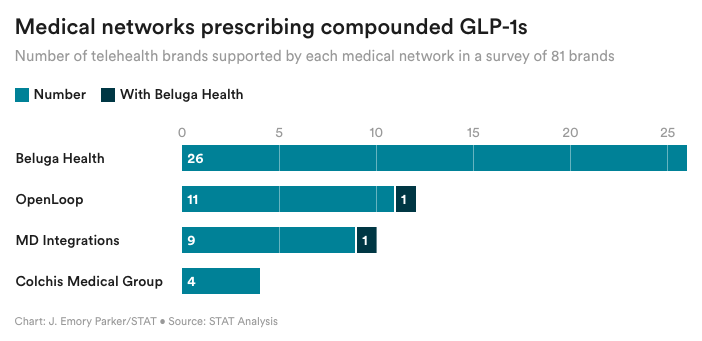Special report
The medical groups propping up the GLP-1 telehealth boom

It's relatively simple to go online and get a prescription for a GLP-1 medication for diabetes or obesity thanks to dozens of companies that have stepped in to fill demand for the potentially life-changing treatments. Behind the scenes, just a few networks of clinicians are writing prescriptions for a large number of websites, STAT's Katie Palmer reports. Some of the sites do not disclose that they don't employ the clinicians that patients see in visits that often resemble a commercial transaction as much as they do health care. Experts said the lucrative arrangements raise a number of concerns.
"This is a humongous red flag, and very scary to me," obesity physician Scott Kahan told Katie. "When you set it up in this scenario, the incentives are so misaligned that I can't imagine it would not be rife with abuse and profit-driven prescribing rather than medical prescribing."
Read Katie's whole special report here
Artificial intelligence
Insurers used tech to deny claims, investigation finds
UnitedHealth Group, Humana, and CVS Health increasingly refused to pay for rehabilitative care for seniors after adopting technologies to aid their decisions, a Senate investigation found. As of 2022, the insurers denied roughly a quarter of all requests for post-acute care at nursing homes and other facilities.
The report, conducted by the U.S. Senate Permanent Subcommittee on Investigations, extensively cites STAT's series last year that investigated the use of algorithms and artificial intelligence within Medicare Advantage plans. The series focused on how UnitedHealth and its subsidiary NaviHealth were using unregulated algorithms to predict when someone could be cut off from rehab care. STAT's investigation revealed, for example, how UnitedHealth pushed employees to abide by the algorithm's predictions, even if patients could barely walk and were not ready to go home.
The report found that the uptick in denials coincided with the increased use of algorithmic tools, including one from NaviHealth. It also found that decisions to use — or not use — particular technologies were tightly correlated with projected impacts on the health insurers' profits.
Read more here
Business Inside the downfall of a cancer focused startup
Earlier this year, Blue Note Therapeutics CEO Geoff Eich shut down the company after failing to convince the Food and Drug Administration that its digital treatment for cancer-related distress would be beneficial to patients. In a series of candid interviews, Eich detailed the company's downfall.
The story underscores the regulatory challenges faced by digital therapeutics developers which are often guided to rigorous clinical trial designs. In Blue Note's case, its treatment showed only a modest improvement compared to a "sham" control. Ultimately, the FDA was most concerned in drop out rates in the study and how it introduced uncertainty to the results.
With no clearance, Eich was unable to convince investors to fund another trial.
"All I can say is we gave it everything we possibly had in terms of looking at different opportunities, even grants, to get money for studies," he told me. "But in the end, it was a question of there just wasn't the will, time, or money."
Read the whole story here


No comments